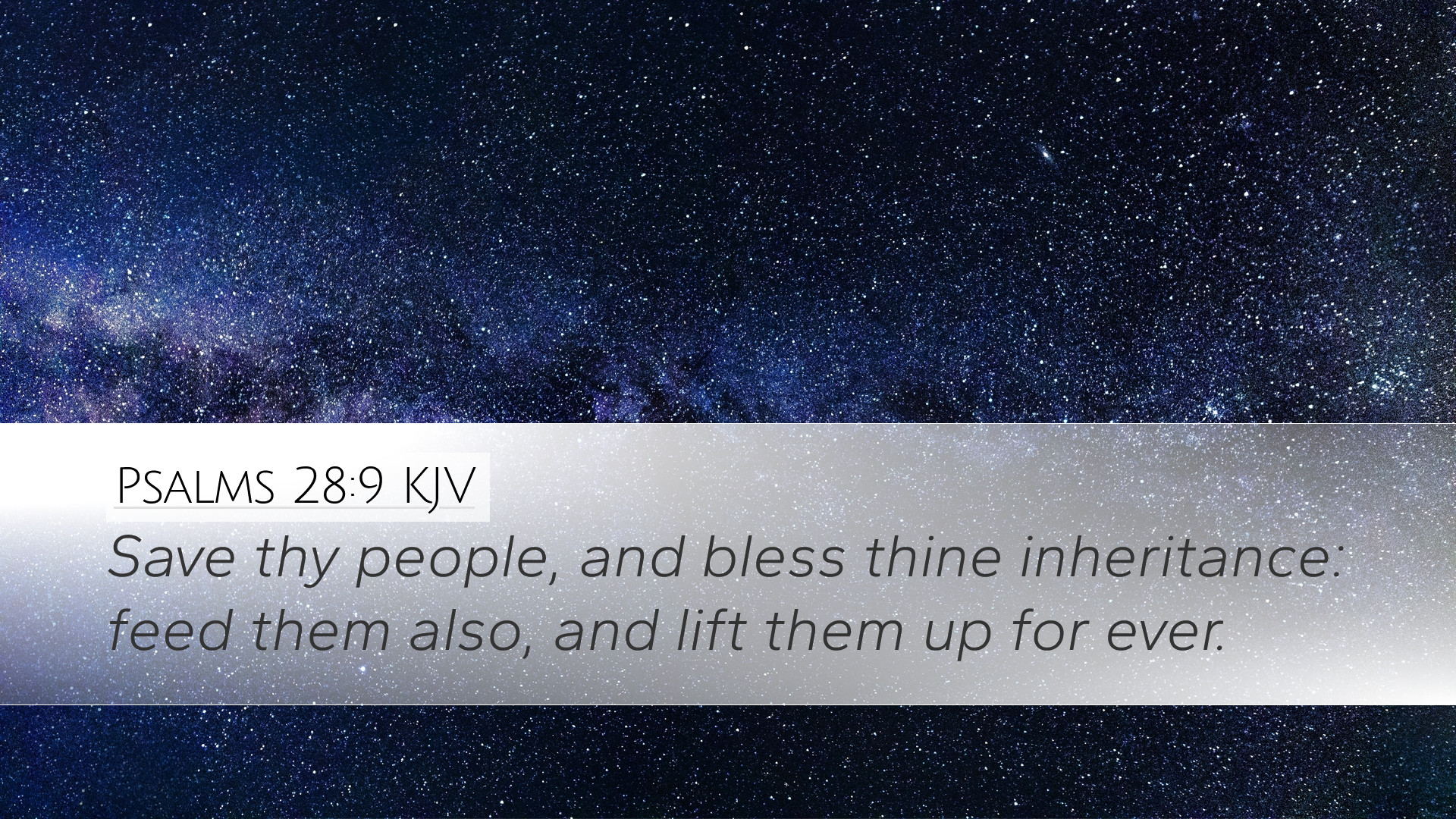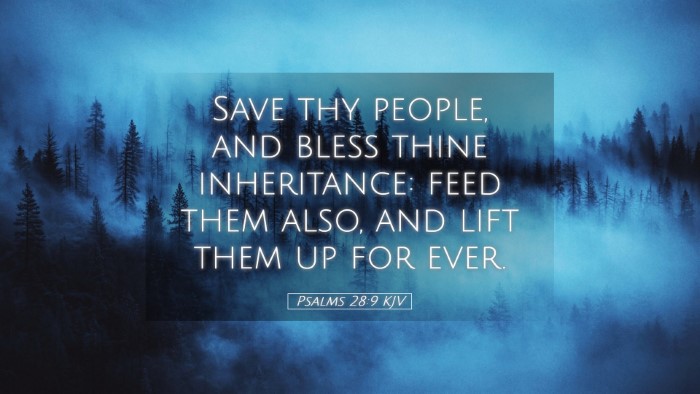Psalms 28:9 Commentary
Verse: "Save thy people, and bless thine inheritance: feed them also, and lift them up for ever."
Introduction
This verse concludes a prayer that recognizes the need for God's intervention and sustaining grace. It exemplifies a deep yearning for divine leadership and care, encapsulating the essence of the psalmist’s plea for salvation and blessing upon God's people.
Summary of Themes
- Divine Salvation: The psalmist implores God to save His people, acknowledging the urgency and necessity for divine intervention in their lives.
- Inheritances and Blessings: There is a recognition of the sanctity of God’s people as His inheritance, emphasizing His ownership and commitment to their welfare.
- Nourishment and Sustenance: The call to "feed them" suggests a need for spiritual nourishment, equating God's provision with care for His people.
- Enduring Support: "Lift them up for ever" signifies the desire for continual support and elevation in the spiritual realm.
Commentary Insights
Matthew Henry's Commentary
Matthew Henry emphasizes the importance of seeking God as the ultimate protector and provider for His people. He notes that the psalmist's plea—that God save His people—underscores the understanding that human strength is inadequate against adversities. Henry explains that calling God "thine inheritance" reflects a recognition of God’s covenant relationship with His followers, evoking the reality that God deeply cares for those whom He has chosen.
Henry also highlights the notion of divine feeding as an assurance that God nourishes His people spiritually and physically. The lifting up signifies both an elevation from sin and despair, and a raising of their spirits towards holiness.
Albert Barnes' Commentary
Albert Barnes elaborates on the idea of God’s providential care for His people. He notes that the prayer encapsulated in this verse is both personal and communal, focusing on collective reclamation from distress. Barnes interprets "Save thy people" as a passionate desire for rescue from oppression, underscoring the role of God as a mighty deliverer.
Furthermore, Barnes reflects on the concept of "bless thine inheritance," pointing out that God’s blessings are not just for the individual believer but for the entire community of faith. The imagery of feeding indicates that God not only saves but also sustains His followers, implying a relationship where God actively engages in the nurturing of His people.
Adam Clarke's Commentary
Adam Clarke provides a thorough examination of the implications of this verse in the context of the psalm. He notes that the plea for salvation presupposes a state of peril in which the psalmist finds himself and his people. Clarke emphasizes that the act of saving is closely tied to blessing, where salvation brings about divine favor.
Clarke further highlights the phrase "feed them," interpreting it as a metaphor for spiritual sustenance and the provision of wisdom and understanding through God’s word. He also points out that “lift them up for ever” conveys the hope of eternal elevation, signifying not only spiritual uplifting but a promise of eternal life in communion with God.
Theological Reflections
The verse presents significant theological themes that can inspire deeper reflection among pastors, scholars, and theologians:
- God’s Covenant Faithfulness: There is an inherent trust in God’s promises, which invites deeper exploration into the nature of God’s relationship with His chosen people.
- Human Vulnerability: The psalmist’s acknowledgment of need connects the contemporary believer with the historical struggles of the faithful, reminding us of our collective dependence on divine grace.
- Community and Intercession: The communal aspect of prayer in this verse encourages believers to not only seek personal blessing but to intercede on behalf of others in the church and the broader world.
- Hope of Restoration: The appeal for lifting up reflects the hope found in Christ's redemptive work, spotlighting the promise of restoration and eternal life that resonates throughout Scripture.
Conclusion
Psalms 28:9 embodies a profound prayer that intertwines themes of salvation, blessings, and divine sustenance. Through insights gleaned from historical commentaries, we uncover a rich tapestry of meaning that extends beyond the text, encouraging believers to trust in God’s providence, intercede for one another, and embrace the hope of eternal life. This verse challenges us to continually turn to the Lord for the strength, nourishment, and upliftment we desperately need in our spiritual journeys.


